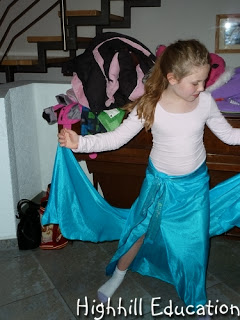Week 17: We held a middle ages market.
Many family names came from crafts practiced during the middle ages; bakers, brewers, millers, shoemakers and thatchers. Sometimes the names were passed down through a female, but they were slightly altered; female brewers were known as brewsters, female bakers were known as baxters, and female weavers were known as spinsters or websters.
Due to conflicts between craftsmen and city officials over money, guilds were formed. The city officials charged fees for selling wares and naturally wanted the largest amount possible. By banding together in guilds, craftsmen could make demands of their own resulting in lower fees. These traditions live on today in labor unions and vendor permits.
If a large enough group of merchants and craftsmen joined together, they could purchase a Free Borough. In other words, they could form their own city and create their own regulations free from the rules of a king. The Republic of Venice is a very successful example of a free Borough.
During the middle ages, markets were often held as special events. Grand markets held once per year share a likeness with state fairs celebrated annually in the United States. Goods from around the known world and entertainment filled the day.
For our medieval market, the kids were divided into seven groups.
Candlemakers
Brewers who sold pretzels and beer (root beer of course)
Silk Traders (Foreign Merchants)
Shoemakers
Smiths
Spice Vendors (Foreign Merchants)
Entertainers
After setting up their booths each group was given a few coins to begin with. Next the lady of the house visited each booth to collect a two pence fee for selling (foreign merchants had to pay three pence). Since most booths had more than one child, they took turns selling and shopping. Coins were used and items were bartered in trade. Entertainers were paid when they were entertaining and obnoxious cries by those selling wares were fined. At one point a thief (mom) was caught steeling from some of the vendors. She was sent to the Tower of London where she remains today awaiting her punishment.
This activity was awesome! The kids loved it and begged for more. By participating they gained a better understanding of the types of products available at medieval markets, practiced counting money, and worked on their social skills and powers of persuasion. Thank you April for putting it together:)









I love it when they beg for more!
ReplyDeleteAsking for more is always the best endorsement.
ReplyDeleteWho wouldn't want more? It looks like a great study.
ReplyDeleteFantastic activity! So many lessons learned in such a natural way.
ReplyDelete